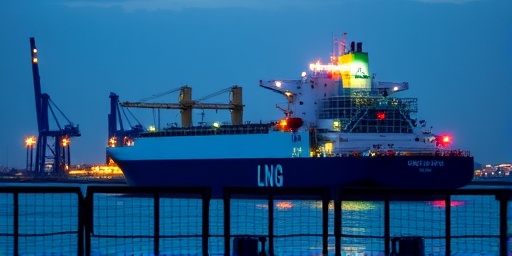In a stark indicator of the brewing storm in the global energy sector, Citi analysts have dramatically cut their price target for Venture Global by 40%, dropping it from $35 to $21 per share. This move comes amid plunging LNG prices and warnings of a prolonged supply overhang that could stifle growth for one of the U.S.’s fastest-rising liquefied natural gas producers. The downgrade, announced on Wednesday, underscores the fragility of the LNG market as geopolitical tensions, oversupply concerns, and shifting demand patterns collide.
Venture Global, a Louisiana-based energy firm known for its aggressive expansion in LNG export facilities, has been a darling of investors betting on America’s energy dominance. However, Citi’s revised outlook paints a more cautious picture, projecting subdued revenues and delayed project timelines due to the current market dynamics. ‘The LNG market is facing headwinds that could persist well into 2025,’ stated Citi analyst Daniel Rich in the research note, highlighting how low spot prices—currently hovering around $8 per million British thermal units (MMBtu) in Asia—are eroding profitability across the board.
Citi’s Stark Warning on LNG Supply Glut Risks
Citi’s decision to slash the price target for Venture Global reflects broader anxieties about an impending LNG supply glut. The bank now forecasts that global LNG capacity could surge by 150 million tonnes per annum (mtpa) by 2027, outpacing demand growth estimated at just 50 mtpa over the same period. This imbalance, according to Citi, stems from a wave of new projects in the U.S., Qatar, and Australia coming online, even as Europe’s post-Ukraine war buying spree cools off.
In their report, Citi emphasized that Venture Global’s ambitious pipeline—including the Plaquemines LNG and CP2 projects—faces execution risks amplified by these market conditions. ‘While Venture Global’s low-cost structure provides a buffer, the prolonged low-price environment could delay financing and commissioning,’ Rich noted. The analyst firm maintained a ‘neutral’ rating on the stock, signaling that while the company remains fundamentally sound, near-term catalysts are scarce.
To illustrate the severity, Citi pointed to recent LNG price trends: Henry Hub spot prices in the U.S. have dipped below $2.50/MMBtu this year, a far cry from the peaks above $9 seen in 2022. Internationally, JKM futures for Asian LNG deliveries have fallen 25% year-to-date, squeezing margins for exporters like Venture Global, whose facilities are designed for long-term contracts but increasingly exposed to spot market volatility.
Venture Global’s Expansion Ambitions Under Scrutiny
Venture Global has positioned itself as a disruptor in the LNG arena since its inception in 2013, rapidly scaling from a startup to a major player with over 20 mtpa of capacity under development. The company’s Calcasieu Pass facility, which began operations in 2022, marked a milestone as one of the first U.S. LNG plants to utilize modular construction for faster rollout. Yet, even as it celebrates these innovations, the firm grapples with regulatory hurdles and market backlash.
Critics, including environmental groups and even some customers like Shell and BP, have accused Venture Global of underdelivering contracted volumes by prioritizing spot sales during high-price periods. This has led to arbitration disputes totaling billions, with a recent U.K. court ruling in favor of buyers seeking $1.3 billion in damages. Citi’s report touches on these issues, warning that legal entanglements could further strain the balance sheet amid soft LNG prices.
Financially, Venture Global reported $4.2 billion in revenue for 2023, up 15% from the prior year, driven by exports from Calcasieu Pass. However, EBITDA margins compressed to 45% due to rising operational costs and lower realizations. Looking ahead, the company aims to bring Plaquemines LNG online by late 2024, potentially adding 20 mtpa of capacity. But Citi analysts question the timeline, citing permitting delays from the Federal Energy Regulatory Commission (FERC) and opposition from climate activists concerned about methane emissions.
Insiders at Venture Global remain optimistic. CEO Mike Sabel stated in a recent earnings call, ‘Our focus on efficiency and innovation will navigate us through this cyclical downturn. We’re building for the long term in a world that still needs reliable energy.’ Despite such assurances, investor sentiment has soured, with shares trading at a 30% discount to peers like Cheniere Energy.
Broader Energy Market Volatility Fuels Investor Caution
The LNG price slump is not isolated to Venture Global; it’s symptomatic of a roiling energy market influenced by multiple forces. Geopolitical events, such as the Israel-Hamas conflict and Red Sea disruptions, have introduced supply chain uncertainties, but they haven’t been enough to reignite the price rally seen last winter. Meanwhile, milder European winters and increased renewable energy adoption have dampened import demand, with EU LNG imports down 10% in Q1 2024 compared to 2023.
Citi’s analysis extends beyond Venture Global, projecting a 20% contraction in global LNG spot prices through 2025 if current trends hold. This outlook aligns with reports from the International Energy Agency (IEA), which warns of a ‘buyer’s market’ emerging as U.S. exports—now at 90 mtpa—continue to flood global terminals. For context, the U.S. has overtaken Qatar and Australia as the world’s top LNG exporter, but this dominance risks backfiring if prices remain depressed.
Other analysts echo Citi’s concerns. RBC Capital Markets recently trimmed its own price target for Cheniere by 15%, citing similar overhang risks, while Goldman Sachs maintains a more bullish stance, forecasting LNG prices to average $10/MMBtu by 2026 on renewed Asian demand from China. ‘The energy market is at a crossroads,’ said energy consultant Sarah Thompson in an interview. ‘Venture Global’s story is compelling, but timing is everything in commodities.’
Commodity traders are also feeling the pinch. Vitol, the world’s largest independent energy trader, reported a 40% drop in first-half profits, partly due to volatile LNG prices. This ripple effect underscores how interconnected the sector is, with Venture Global’s fortunes tied not just to its operations but to macroeconomic factors like U.S. interest rates and global economic growth.
Investor Reactions and Strategic Shifts in the LNG Sector
Following Citi’s downgrade, Venture Global’s stock plummeted 8% in after-hours trading, erasing recent gains and highlighting investor jitters. Hedge funds and institutional players, who hold over 60% of the float, are reassessing positions. One portfolio manager at BlackRock noted, ‘We’re trimming exposure to pure-play LNG names like Venture Global until clarity emerges on the supply-demand balance.’
In response, Venture Global has signaled strategic adjustments, including cost-cutting measures and a push for more flexible contracts. The company is also exploring carbon capture technologies to appease regulators and attract ESG-focused investors. These moves could mitigate some risks, but Citi warns that without a price recovery, return on invested capital (ROIC) might fall below 10%, deterring new project funding.
Comparatively, diversified energy giants like ExxonMobil are faring better, with integrated operations buffering against LNG volatility. Venture Global’s reliance on a single commodity exposes it more acutely, prompting calls for diversification into hydrogen or renewables—though such pivots would take years.
Market data supports the caution: The S&P Global LNG Index has declined 12% year-to-date, underperforming the broader energy sector by 5 points. Futures curves show contango, with near-term prices lower than long-dated ones, suggesting traders anticipate prolonged weakness.
Outlook: Navigating LNG Turbulence Toward Recovery
As the dust settles on Citi’s price target cut, the path forward for Venture Global and the LNG market hinges on several variables. A potential rebound in Asian demand, driven by China’s economic stimulus, could lift prices by mid-2025, per Citi’s base case. However, escalation in global conflicts or stricter emissions policies might prolong the downturn.
For investors, the message is clear: Patience will be key. Venture Global’s strong asset base and experienced management position it well for eventual upside, but near-term volatility demands selective exposure. Broader implications for the energy market include accelerated consolidation, with smaller players potentially acquired by majors seeking scale.
Regulators are watching closely too. The U.S. Department of Energy’s recent pause on new LNG export approvals adds another layer of uncertainty, potentially capping supply growth and aiding price stabilization. As one industry executive put it, ‘The LNG boom isn’t over—it’s evolving.’ Venture Global, if it adapts swiftly, could emerge stronger from this turmoil, but the road ahead remains fraught with challenges in the ever-shifting energy landscape.








